'Dysfunctional.' 'Embarrassment.' 'Travesty.' Readers vent on Wisconsin Supreme Court race
Race made it clear why electing judges is a bad idea
It has become increasingly clear why many if not most states, as well as the drafters of the U.S. Constitution in the case of federal judges, have concluded that electing judges is a bad idea.
Politicians not knowing or caring about the quality of judges have hijacked the judicial branch. Supreme Court candidates must take overtly partisan positions to attract money and votes.
In the lower courts, where judges are appointed to fill mid-term vacancies and required to stand for immediate election, (former Gov Scott) Walker-appointed judges in progressive districts and (Gov. Tony) Evers-appointed judges in conservative districts have been successfully targeted (as I was) not based on judicial performance but rather by political parties eager to weaponize the judiciary for political gain.
As a result, good candidates without a partisan agenda, if they are willing to seek a judicial seat at all in such an environment, have no chance of winning. The legal system is worse for it.
It is time for judges in Wisconsin to be appointed on the basis of competence through the use of a bi-partisan commission and retention elections (as many other states do and as advanced by prominent judicial voices such as Sandra Day O’Connor), rather than contested elections.
Hon. Jeffrey Davis (retired), Mequon
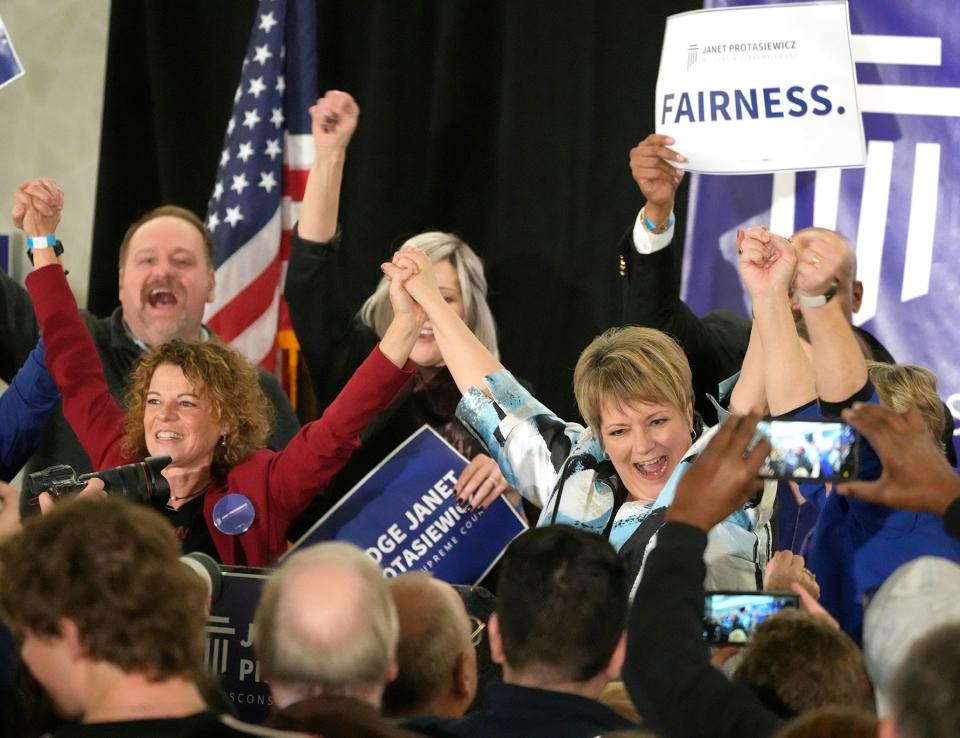
Election an embarrassment for 'progressive' state
There has got to be a better way! I am talking about the way Wisconsin selects its Supreme Court justices.
The recent election for the Wisconsin Supreme Court was an embarrassment to a state that once thought of itself as progressive. These elections are supposed to be non-partisan; they are not. They are supposed to be conducted at a high level because they deal with the courts; they are not.
The Wisconsin Supreme Court race saw more than $28.8 million spent on ads, surpassing the national record for these kinds of elections. The ads, particularly on TV, were mudslinging at its worst on both sides. As voting citizens, we should be appalled by the way the candidates ran their campaigns. We can do better in Wisconsin.
No system will be perfect, but Wisconsin should consider another method of selecting Supreme Court justices. It is time for change in Wisconsin.
Robert J. DeRoche, Greendale
State Bar Association should recommend judicial candidates
Negative campaign tactics work. Or do they?
Advisors to campaigns underestimate the intelligence of the independent voter. The recent Supreme Court election activity should never have been shaped the way it was. The non-party affiliated voter wants to know why to vote for a candidate — educational background and experience are the basis for our decisions, not alarmism.
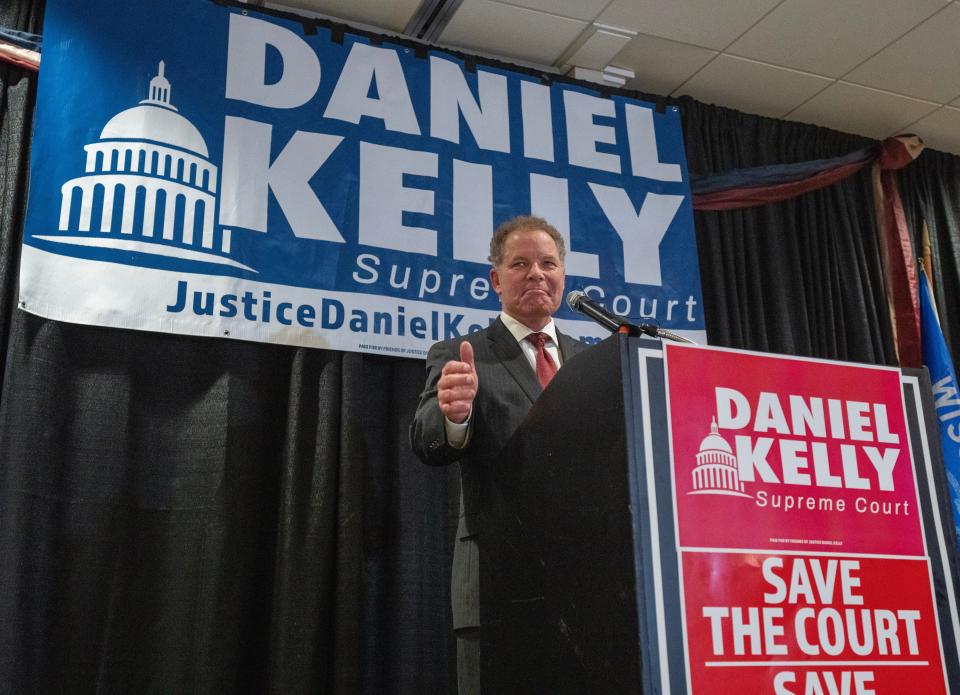
In my former state, the professional bar associations suggested qualified Supreme Court nominees, thus limiting partisan politics from a non-partisan office.
Maybe the two party system should respect their responsibility for a fair and honest appraisal of the candidates. If this concept is acceptable, it should also pertain to timely review of all nominees.
Dick Dieffenbach, Cedarburg
Tougher libel laws a fix for disgusting ads, but only a dream
The elections for Wisconsin Supreme Court justices have become a sorry reflection of our dysfunctional politics and the amount and tone of the negative advertising this election was disgusting.
The money spent this time was a record. The negative/misinformative ads were aimed at the ill-informed of the electorate and painted the opposing candidate soft on crime. The ads were everywhere. The money was aimed at putting into office judges with ideologies and biases that favor contributors.
I think the solutions are simple but impossible at the same time. If we want judges who will handle cases free of political, ideological or monetary influence, we need government financed campaigns (free of the influence of powerful donors) and to subject political ads to the same libel laws that exist elsewhere.
But in this political climate that’s an impossible dream.
Joseph Geck, Waukesha
Bar association vetting, ranked choice options could end rancor
Election campaigns should educate voters how a vote for a given candidate would make Wisconsin better. We need our legislature to pass campaign legislation which insists candidates only address their positions on issues and refrain from demonizing opponents.
The Wisconsin Bar Association should submit a list of the five best candidates who seek the Supreme Court vacancy. Those candidate’s ads can then be cleared for airing by the Wisconsin Election Commission using algorithms to screen out political partisanship and demeaning attacks on other candidates.
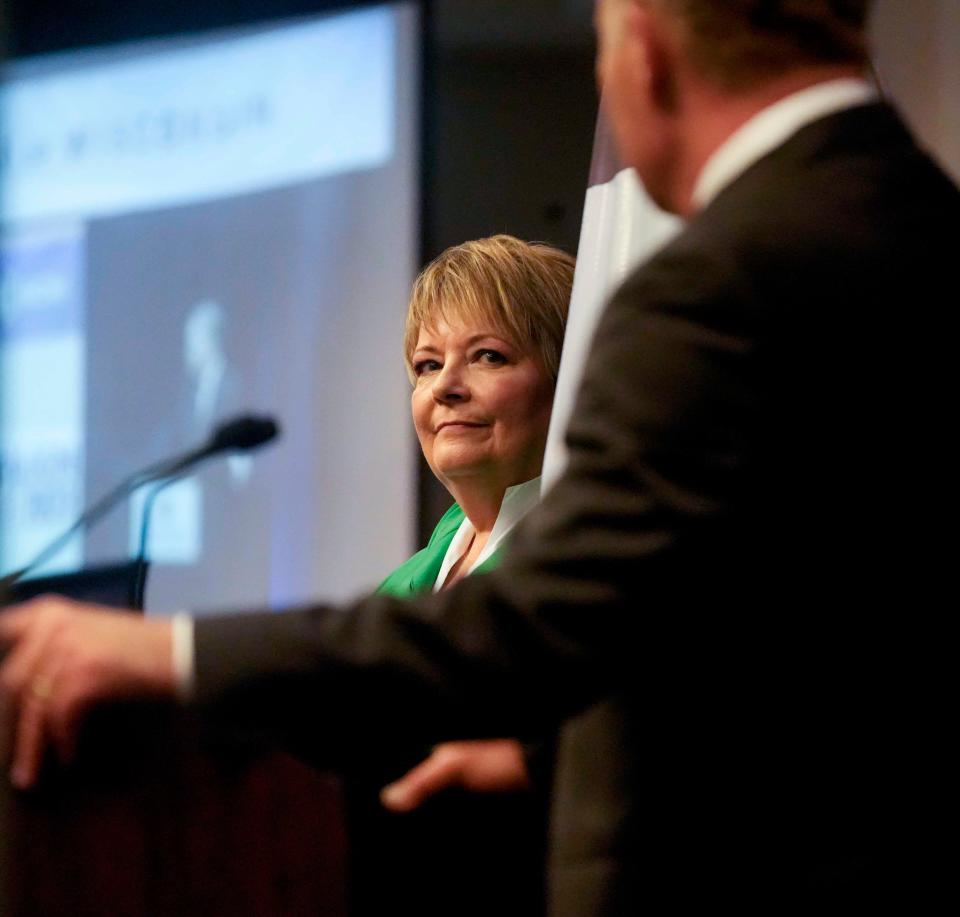
Ranked choice voting would determine the next Wisconsin Supreme Court justice. This would eliminate a primary election as voters rank their preference for the candidates first through fifth. If a candidate did not receive a majority of the vote, the second choice votes are added, followed by the third, fourth and fifth place votes until one candidate achieves the winning majority.
This plan would free the voter from false and misleading campaign advertising and provide a truthful portrait as to why a candidate is the best choice for a better Wisconsin. It also could be a template for all our elections, ending the rancor and character assassination that has become the norm in Wisconsin’s elections.
Jerry Hanson, Elkhorn
Call for fixing high court elections an impossible task
In the quest for a solution to the divisive and partisan ads and ginormous money spent on the latest State Supreme Court election, I don’t think it’s possible.
The state of Wisconsin, with almost 5.9 million residents, seems closely divided, 50-50, when it comes to political parties. The word compromise is not in anyone’s vocabulary anymore.
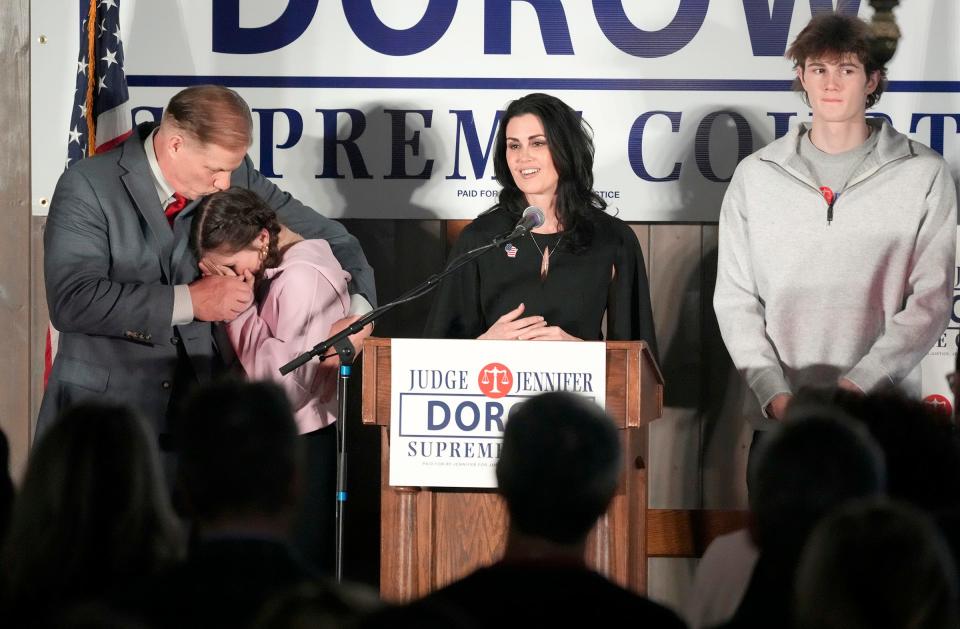
The United States Supreme Court made it lawful for mega money donations; injecting, interfering and supporting wealthy partisanship on any and all state elections. The Constitution which separates the legislative, executive and judicial branches of our government so that none have over reaching powers has become a travesty of partisanship.
The Fourth and Fifth Estates print, publish, blog, televise etc. alternate facts, which now makes truth nonexistent at worst, questionable at best.
I am an independent voter. I sadly have no winning formula for people who refuse to listen to the opposition, who are not willing to give a little to get a little, who do not believe in separation of church and state. You have asked for the impossible.
Maureen Iglar, Oconomowoc
Two advertising techniques especially damaging in court races
I write to criticize two advertising techniques commonly used in Wisconsin judicial campaigns, including the recent Supreme Court primary and general election races. These techniques reflect poorly on the candidates who use them, as well as any voters whose votes are affected.
One is the attack on candidates who have served as judges based on a few of their cases cherry-picked from the thousands of cases they handled in their judicial careers. These attacks, with little or no context about the cases, are offered to argue that the judge was anywhere from stupid to soft on crime. Anyone who has practiced criminal law, as I did for 42 years, knows that criminal cases are complex and that reasonable people can disagree about the "best" result. To pretend otherwise is ignorant and/or panders to what the candidate hopes is the ignorance of the voting populace.
The other technique is an attack on a candidate because they have represented defendants accused of terrible crimes. This attack implies that the candidate tolerates the crime or is somehow responsible for perpetuating it. Any judicial candidate knows or should know that it is a principle of the criminal justice system, and of the legal profession, that every defendant is entitled to effective representation. The lawyer who provides it upholds that principle and criticism for doing so is ignorant and/or disingenuous.
These common campaign techniques, which were used in our recent Supreme Court elections, will not end until the candidates develop some integrity or until the voters understand and reject the brainless and pandering nature of these techniques.
Mel Johnson, Whitefish Bay
With gerrymandering, need for electing Supreme Court members vital
The amount of money spent in the recent Supreme Court election was obscene. And it became very partisan. But, without the statewide election of justices, the people’s voices would be irrelevant, again.
Wisconsin votes have already been deluded for over a decade due to gerrymandering. Putting the appointment of justices in the hands of the governor and/or the gerrymandered legislature will only increase the partisanship and could result in a stalemate where no justice is appointed. Or, the gerrymandered majority could lock in the judiciary forever.
Unlike several other states, Wisconsin voters do not have the ability to introduce a ballot initiative. If Wisconsin had a process for a direct ballot initiative, a petition with the necessary acquired signatures would put the question to a statewide vote. Voters could then bypass the gerrymandered legislature and create, change or repeal laws. This would allow the public to actually vote on popular issues, such as nonpartisan redistricting, and finally end gerrymandering.
Even with all the flaws, we need to continue to elect Wisconsin Supreme Court justices. Giving the voters the ability to introduce ballot initiatives would also benefit democracy.
Carol Lenz, Appleton
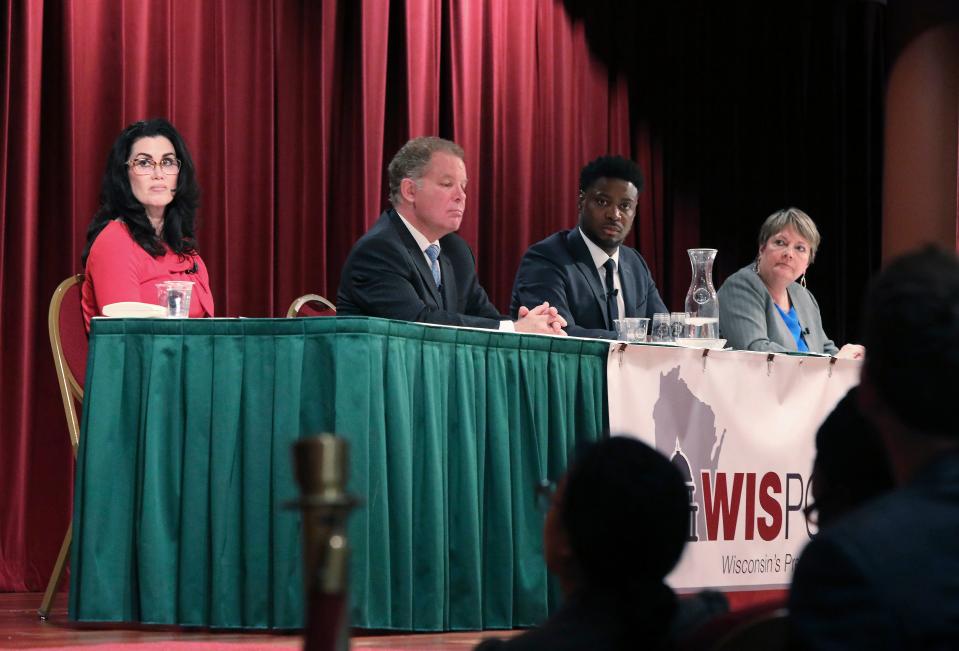
Election was ugly but ultimately voters had the final say
While the partisan nature of Wisconsin’s 2023 nonpartisan Supreme Court election was played up by both major political parties, the results suggest that candidates whose approach to jurisprudence makes the most sense to the general public are more likely to be granted the consent of the governed — political identities and partisan attacks notwithstanding.
The overall results also suggest that crime prevention and enforcement, abortion, work requirements for government assistance and legislative districting, among others, aren’t as partisan as some would think. It’s becoming more and more difficult for partisans to come up with plausible wedge issues.
Nevertheless, acrimony and partisanship in nonpartisan judicial elections are byproducts of a two-party political system. When a party in power uses the courts as a means to solidify its own legislative power, the onus falls on those same courts to sort out disputes from the party that has been stripped of its legislative authority. Unfortunately, the acrimony and partisanship will continue until acrimonious partisans stop abusing the courts as a means to their own political ends.
Also, unfortunately, the big money will continue flowing until the elected officials who rely on it enact legislation to prevent it.
Gary Lyons, Kenosha
Talking more about families would have helped candidates
After more than three months of repetitive TV ads for both the primary in February and the April Supreme Court election, it is almost refreshing to return to the likes of normal repetitive commercials.
What stands out most to me, looking back to the race, is the fact that I cannot recall one ad and/or interview that made mention or showed the candidate with a family member, i.e., wife, husband, children, grandchildren. With abortion being of such prominent focus, I feel both Daniel Kelly and Janet Protasiewicz should have had some familial reference as part of their campaigns.
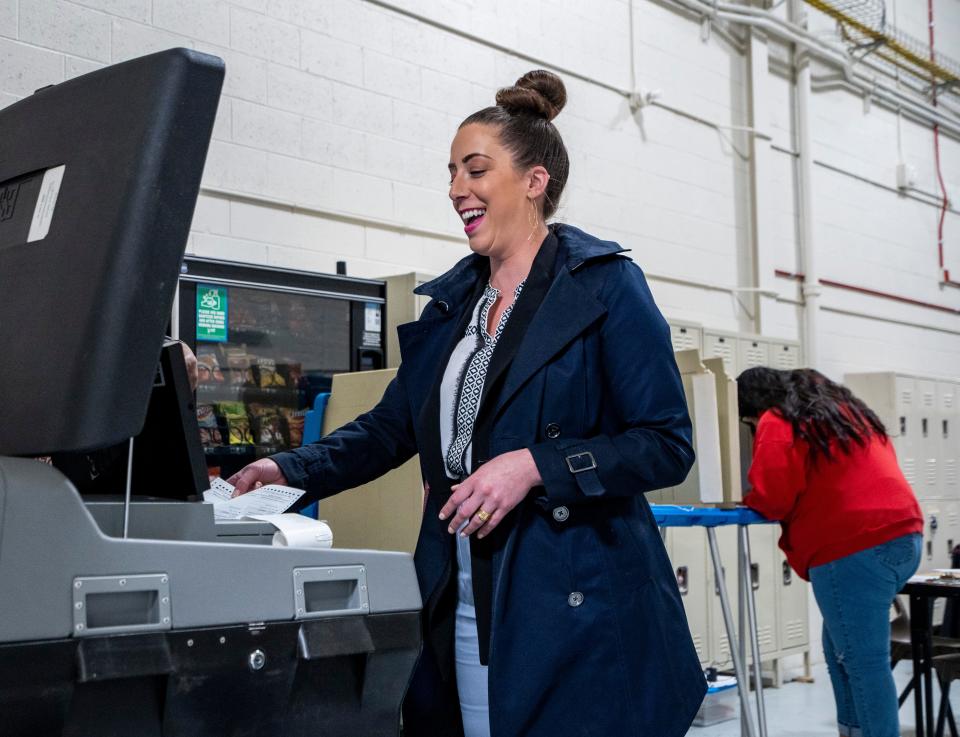
Both came across as qualified contenders but failed to display any personal trait that I, as a voter, could identify with.
Patricia Pomahac, Franklin
Stopping wealthy from buying elections would help
In the April 16 Ideas Lab, an appeal was made for letters on how to get big money and acrimony out of politics. On the same day, letter writer Phillip Torsrud mentions that working-class people don’t have children “because it’s too expensive” (“Articles on Milwaukee growth missed important points”).
There two topics are directly related. Over four decades ago, the Reagan administration began a huge transfer of wealth from America’s working people to the billionaire class. Since then, tax cut after tax cut to America’s wealthiest has left the rest of us picking up the tab to make the billionaires richer still.
In turn, the wealthy spend hundreds of millions every election year to elect politicians who will further their interests and to convince working people to vote against their own. The U.S. Supreme Court’s infamous Citizens United decision allows unlimited anonymous money to go to political action committees that create vicious attack ads which poison our democracy’s political discourse.
Income inequality is destroying America’s middle class, our democracy, and paving the way for political demagogues who spread fear rather than solve problems. The wealthy need to pay their share of taxes instead of buying corrupt politicians.
Steven Shea, Cudahy
Election the byproduct of gerrymandering, dark money, lies
Gerrymandering is legalized cheating. Dark money political donations are legalized corruption. Political ads filled with lies, distortions, distractions, misinformation and hateful opinions are First Amendment protected speech.
Acrimony and partisanship directly correlate to the frequency, duration and intensity of campaign ads. Fueled by big money and in defiance of the spirit of truth in advertising, these ads more accurately inflame rather than inform. Ignore them.

In reality the truth carries its own weight. It exists whether or not we see it, seek it, understand it or even value it. And truth, much like Covid-19, cares not about party affiliation, how much money one makes or who one loves.
Never vote for proven liar candidates who spinelessly enable, embrace or embolden one party affiliation. Loyalty based on lies represents the epitome of traitorous irresponsibility. The truth matters. Democracy and justice demand trust. Trust can’t exist without truth.
The reputation of our courts and our country depend on honorable trustworthy men and women responsibly representing our best interests.
Jim Smole, Elm Grove
Stop electing judges to help put an end to acrimony
If Wisconsin sincerely wants to avoid the acrimony that raised its ugly head in the recent Wisconsin Supreme court election, it must eliminate elections altogether. Have all interested parties print the names of their “qualified” judges (that, in and of itself would be debatable) on lottery balls and drop them into the Wisconsin lottery machine. Anyone can participate, but a specific name must be added only once. Turn on the mixing machine, and the first name that gets spit out becomes the new Supreme Court justice.
It is unfortunate, but other than that there is probably no acceptable way to avoid the rancor. Even then, a segment of the population would insist that the process was somehow “rigged.”
For a large segment of the electorate, critical thinking is on life support, replaced by either inability or refusal to differentiate between truth and lies. Too many people hear only what they want to hear, and too many people have their minds made up (“… don’t confuse me with any supposed facts…”) making truth malleable and reality overwhelmed by fantasy.
R. Sterling, Menomonee Falls
Ending gerrymandering would help fix acrimony
The Supreme Court of Wisconsin is often asked to settle matters that are not resolved by the state legislature. The extremely gerrymandered Assembly and Senate districts have given us a legislature that does not represent the will and priorities of our citizens.
One important action to eliminate the acrimony of our recent election is to develop a more fair and more transparent method of drawing the district maps.
Michael Switzenbaum, Whitefish Bay
In the end, Republicans voted against own choice
Does our state need good politicians or good legislators? Is it more important to win seats or to get something done?
Wisconsin has an equal split of Democrats vs. Republicans voters, but gerrymandered district maps have given Republicans majority control over our government. This past election for Supreme Court judge resulted in a landslide win for a liberal judge. Some typically Republican voters must have decided to vote against their party’s favored candidate.
Now the playing field can be made level and allow all Wisconsin voters to have an equal voice in our government. It is time to stop labeling each other and start listening to one another. We must recognize that a variety of opinions can exist, but fact is fact and truth is truth.
Money has the power to corrupt individuals and institutions. Dark money must not be allowed in our politics. Perhaps we can set a limit on how much money a candidate can spend on an election. Voters should be made aware of the source of each candidate’s funding.
In the end, we owe it to ourselves and each other to vote for candidates that will work for us instead of working to raise money for their next election.
Susan Swoboda, Whitewater
Getting money, fear out of the picture would help
One side fights for inclusion for all groups, while the other to save our culture. With the advent of social media, a vast percentage of us spend much time in our own, often ugly, echo chamber.
If, somehow, we could sit at the table and discuss our fears, aspirations and goals, then maybe we’d see that we want many of the same things. Big money, acrimony and partisanship, it doesn’t matter which issue you blame because they’re all fear-based. Each group fears what the other represents, whether it’s flying a confederate flag or a rainbow. It’s so easy to get us humans rattled.
If it were possible, the best starting point would be getting big money out of the picture. Less negative ads, anger, acrimony, extremism, means less fear. Then maybe we can truly “see” others. History reveals many societies that became lost in fear. Fear the other, vilify the other, then attack violently. If we follow that path, how can we ever see the real candidate him/herself?
There’s only one way to fix it. It’s bigger than the Court. We need a responsive legislature. We need to vote out those who don’t work for the people. We are their employer.
George Wen, Delavan
This article originally appeared on Milwaukee Journal Sentinel: Letter writers offer ideas on fixing Wisconsin Supreme Court elections.

